#fancy cut yellow diamond ring
Explore tagged Tumblr posts
Text
The Art of Luxury: Elevate Your Style with Fancy Cut Yellow Diamond Rings
Fancy cut yellow diamonds are an extraordinary choice for those who want to stand out with their jewelry. Known for their rich hues and non-traditional shapes, these diamonds make a bold and elegant statement. One exceptional piece that showcases the beauty of fancy cut yellow diamonds is the Thio Fancy Cut Yellow Diamond Ring from Shop Vivaan. Let’s explore why fancy cut yellow diamonds are so unique and why they continue to captivate jewelry enthusiasts.

Why Fancy Cut Yellow Diamonds Stand Out
Yellow diamonds, also called canary diamonds, are admired for their vibrant golden tones. Unlike traditional white diamonds, these stunning gems derive their color from the presence of nitrogen, which gives them their beautiful yellow hue. Fancy cut diamonds take this rarity to the next level by using unique, artistic shapes like emerald, cushion, and oval cuts that enhance the diamond's brilliance.
A fancy cut yellow diamond is the perfect choice for those who appreciate something more personalized and creative in their jewelry. The various cuts allow the diamond to reflect light in a way that highlights its natural beauty, giving each piece a truly distinctive look.
The Charm of Fancy Cut Yellow Diamond Rings
Vibrant Colors: Fancy cut yellow diamonds are adored for their intense and radiant colors. Whether you choose a bold canary yellow or a softer, more subtle shade, the diamond's hue creates a warm and glowing effect.
Unique and Unconventional: With fancy cuts, such as pear, emerald, or marquise, your yellow diamond becomes an artistic expression of individuality. Each cut brings out different facets, giving the diamond a one-of-a-kind appearance.
A Statement of Luxury: These diamonds are not only rare but also a symbol of elegance and luxury. The intricate cuts combined with the vivid color make any piece a timeless treasure.
The Thio Fancy Cut Yellow Diamond Ring
The Thio Fancy Cut Yellow Diamond Ring from Shop Vivaan is a masterpiece that embodies both elegance and sophistication. With its expertly crafted band and striking yellow diamond centerpiece, this ring is perfect for those who want to add a splash of color and luxury to their collection. The fancy cut ensures that the diamond shines brightly from every angle, catching the light in a way that enhances its rich golden color.
Whether you’re looking for an engagement ring, an anniversary gift, or just an extraordinary accessory to elevate your personal style, the Thio ring is an unforgettable choice.
FAQs About Fancy Cut Yellow Diamonds
1. What is a fancy cut diamond?A fancy cut diamond refers to any diamond shape other than the traditional round cut. Popular fancy cuts include emerald, cushion, pear, oval, and marquise. These cuts are designed to maximize the diamond's brilliance and give the stone a distinctive shape.
2. Are yellow diamonds rare?Yes, yellow diamonds are considered rare, particularly those with a deep, vibrant color. The more intense the yellow hue, the rarer and more valuable the diamond becomes.
3. How should I care for my fancy cut yellow diamond ring?To keep your yellow diamond ring looking its best, clean it regularly with a mild soap and water solution, and use a soft brush to gently scrub away any dirt. It’s also recommended to have your jewelry professionally cleaned and inspected at least once a year to ensure the setting remains secure.
4. What makes yellow diamonds different from white diamonds?Yellow diamonds get their color from nitrogen present in the crystal structure, while white diamonds are typically free from such impurities. The presence of nitrogen gives yellow diamonds their unique and vibrant color, making them stand out from traditional white diamonds.
5. Are fancy cut diamonds more expensive?Fancy cut diamonds can sometimes be less expensive than round diamonds because round cuts produce more waste during the cutting process. However, the value of a fancy cut yellow diamond depends on factors like the intensity of the color, clarity, and carat weight.
6. What metal complements yellow diamonds best?Yellow diamonds look stunning when set in both white and yellow gold. White gold enhances the diamond's brightness and contrasts with its warm color, while yellow gold complements the golden tones, creating a harmonious and luxurious look.
Conclusion
Fancy cut yellow diamonds are a brilliant choice for anyone looking for something unique and luxurious in their jewelry. The combination of vibrant color and artistic cuts makes these diamonds a standout feature in any collection. The Thio Fancy Cut Yellow Diamond Ring from Shop Vivaan is an excellent example of how craftsmanship and creativity can turn a piece of jewelry into a timeless work of art. If you’re ready to embrace the elegance of fancy cut yellow diamonds, explore the stunning collection at Shop Vivaan.
Let your jewelry tell a story with the remarkable beauty of yellow diamonds!
0 notes
Text
the best man! luigi mangione x reader
summary it’s your brother’s wedding this weekend. best man! luigi and you are in charge of finding something old, something new, something borrowed, and something blue to gift your sister-in-law for the wedding!
no warnings! just fluff and vibes. slight enemies to lovers? he’s your brothers best friend, so naturally there’s a bit of a push and pull. comfort + slice of life . pls tell me if u like!
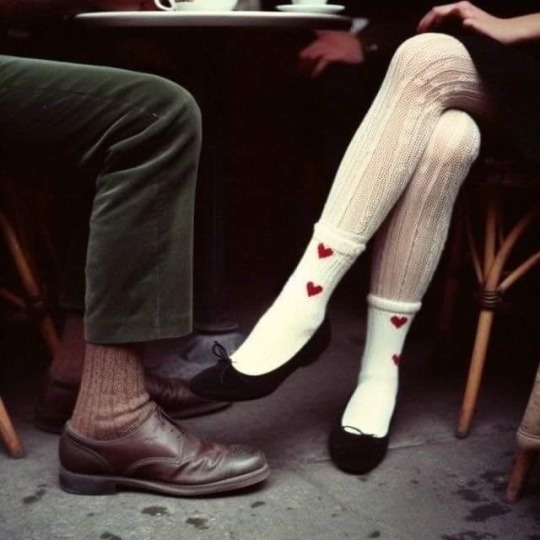
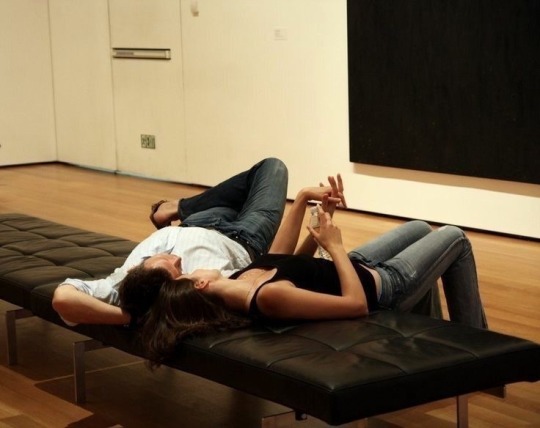
for the first and last time, your brother entrusts you with his shiny silver credit card.
the fancy card was shoved in the back of your scuffed clear phone case, and yet, you couldn’t help but feel a touch of pride swinging it around. it felt like everyone around you now knew about your exclusive access to mediocre airplane food and flight points no one ever knew how to use. of course, the real perk was priceless: this thing was doing a great job at stroking your ego.
“i’m sure we won’t find something borrowed at swarvoski, y/n.”
your brother’s last-minute plea to fulfill the wedding tradition of something old, something new, something borrowed, and something blue came with two conditions: an unlimited budget and the unspoken punishment of spending the weekend with his best friend.
“luigi, all diamonds are borrowed,” you huff. “we didn’t find them under the mall or in america.”
luigi had dropped by your house far too early in the morning for you to be in a good mood. he hadn’t been fair, either, proudly announcing that he’d already fulfilled two out of four of the needed items on the list. something old: the beloved couples prom photo glossed over and re-framed, tossed at the back of his car for all those with eyes to see. and something blue: a pair of bright blue oval sunglasses the boys had found in tokyo. you tried to tell him that, objectively, the glasses were really fucking ugly and there was just no way anyone could give that to a woman on her wedding day. luigi wouldn’t listen. he tried to sell you on the idea that the foreign souvenir was sentimental, proof your brother had been thinking about her despite time and distance, but you were already settled on the idea that oval sunglasses hadn’t been a good idea since the nineties.
you stare down the case of rings intently. before you can find one that catches your eye, luigi interrupts again, “she’s already getting two rings.”
“she has two hands,” you argue.
“you have two shoulders; you don’t wear a bag on each everyday.”
“you don’t see me everyday.”
“right.” he agrees seemingly just to agree. the brunette boy leans over the counter, casting his masculine judgement over the case of brightly colored jewelry.
just as the quiet settles in, he comes with a grumble, “these are impractical.”
they’re supposed to be. they wear bold, unconventional jewels. to his point, their gallant design teetered on the edge of gaudy, yet there’s the one. the white idyllia cocktail ring: a mix of cut gemstones, with a delicate flower design at its heart. the petals were a collection of smooth yellow stones, curled in a way that almost looks like they’re caught mid-bloom, while the rhodium plating gives it a nice silver contrast. it’s sweet but striking, the kind of piece that demands attention without screaming for it.
“they’re cocktail rings,” you say, defensive.
luigi lifts one shoulder up to shrug. “they’re tacky.”
“you wear hybrid shorts and souvenir tees—“
“are you two alright over here?” the sales associate chirps, all bright eyes and perfect teeth.
“we are perfect,” you reply through a small, forced smile, your headache blooming like a bad omen.
she’s tall, polished, and dangerously cheerful for how early it is. “what’s the occasion?”
“a wedding—” you start.
“oh, wow, a wedding?” she gasps, practically vibrating with enthusiasm. “congratulations! you two make such a beautiful couple.”
the sheer horror of spending any more life tethered to luigi hits you like a truck. you open your mouth to deny it, but before you can, luigi nods with a polite, “thank you.”
he doesn’t even flinch, casually inspecting a display of bracelets while you’re left to choke on your indignation. you freeze, caught between correcting the mistake and just letting it slide. but before you can make up your mind, luigi leans in, casually gesturing to a row of silver tennis bracelets. “we’re actually just picking out something nice for her before the big night,” he says with a playful grin, his tone light and teasing.
the sales associate beams, clearly oblivious to the tension between you two. “how lovely!“ she sings. “you’re both so lucky to have each other.”
“so lucky,” you manage.
luigi, on the other hand, doesn’t miss a beat, turning to the associate with that effortless charm you’ve heard so much about but never actually seen in practice. “we were just talking about how much we prefer simpler jewelry, you know? nothing too flashy. like those rings over there, totally not our thing, right babe?” he grins, nudging you playfully before adding, “these thin bracelets look nice, though.”
“tennis bracelets,” you correct him, trying hard not to look annoyed.
“whatever you want, babe,” he says with a wink, clearly having way too much fun with this.
the sales woman says something chirpy before fluttering off to grab a tray of options, and luigi leans closer to you with a stupid playful smirk. “you know, it’s fun messing with people sometimes,” he tells you.
you rub your temples in attempt to soothe your storming headache. “you’re just being annoying,” you say, deflated. “i’m gonna go grab a coffee. please just don’t get an ugly color like yellow or green.”
he cocks his head to the side. “i like those colors?”
that doesn’t surprise you. “you’re one of a kind, mangione,” you hum, the words almost losing their bite as you slip the shiny silver card from your case, tapping it lightly against his chest. “have fun. just text me when you’re done.”
luigi opens his mouth to reply with something, perhaps incentive to stay to keep you between him and the sales associate, but before he can get it out, the winter chill finally gets the best of you. you make a sharp, purposeful exit, walking fast enough to look like you know where you’re going, but not so fast it’s obvious you’re trying to escape.
the cold air bites at your skin, but your instincts were right: espresso is the only thing that’ll fix your morning. you settle by the fountain, wrapping your hands around the warmth of your cup, grateful for the quiet. just as the steam from your drink begins to settle, you hear the rustle of gift bags. expensive gift bags.
you look up. luigi, brown-haired and a bit late. “you didn’t answer my texts,” he says.
you blink, then glance over at your phone.
from Luigi Mangione (Penn) Where are you
from Luigi Mangione (Penn) I hate this mall
Luigi Mangione (Penn) is now sharing his location with you! Would you like to share it back?
from Luigi Mangione (Penn) Fucking answer me
3 missed calls
“oh my god,” you say, eyes widening. “luigi, i swear i’d never do that on purpose.”
before he takes the chair beside you, he gives you a telling look. you would.
“pep,” you frown, the childhood nickname rolling off your tongue seemingly ticked him off more. “seriously, my mind hasn’t been working all day. i haven’t slept and—you know. everything’s just been weird.”
“alright,” he sighs, trying. “what’s bothering you?”
“you’d think it’s stupid,” you say, trying to dismiss the purpose of your sadness entirely. at the end of the day, you didn’t want to get into your dip in depression with your brother’s best friend. all your woes would just turn into an endless run of joke material at next year’s thanksgiving. “what’d you buy?”
“silver thing.” luigi answers, sliding the giftbag toward you. “shiny, impossible to hate. we’ll have to pull together something more interesting for something borrowed.”
you nod, flying through the clouds of gift wrap to get to the beautifully extravagant
yellow
box.
your lips pull into a straight line.
“they were out of the other color boxes. but the bracelets silver,” he tells you.
you touch the box gingerly and try to take the high road. there was no reason to end a bad week worse. “i’m sure it’s nice,” you manage.
luigi crosses his arms over his chest. “look in the other bag,” he says, slightly pushy. you brighten up, slightly at this—he was a smart guy, but was he wise and willing enough to invest in options?
you turn to the other bag with the other box, also mustard fucking yellow, but smaller and more delicate. pulling the top open, you reveal the white flower ring you’d been eyeing earlier—its petals a soft, intricate design that now seems even more beautiful in your hands.
“you kept looking at that ring,” luigi points out. “it’s yellow.”
you first look at him, then the ring. did he seriously buy this just to prove a fucking point?
“it’s white and gold.”
“says yellow on the receipt.”
you sigh, shutting the lid and dropping it back into it’s fancy gift bag. “i guess we’ll have to ask the bride.”
“we can go back and ask the sales associate for all i fuckin’ care,” he says, his tone firm. you laugh at how silly this is.
“you swiped my brother’s card for a ring, just so we could argue about it?” you say, rolling your eyes. “somehow, i’m the one everyone calls crazy?”
“no, i put that one on my card,” luigi corrects. “you can keep it.”
you freeze, looking up at him, confused. he wasn’t the type to indulge in unnecessary accessories. he hated consumerism. hell, he’d gone off about capitalism all the way over here. “what do you mean?”
“you liked it.” he shrugged. “it’d look good on you anyway, just keep it.”
you blink, momentarily thrown off. it sounds so silly, but as you look at him, you realize it’s the nicest thing that’s happened to you all week. you feel a warmth spread through you, unexpected but welcome. you lunge in for what was probably your first ever hug.
“aw, pep,” you say, tone soft and musical.
he pulls back, “no—we don’t have to—”
“no, seriously, you have no idea how awful this week has been for me,” you sigh into his neck. his warmth feels nice. warranted. he’d allow it. “thank you.”
“tell me,” luigi says into your hair. he hugs his arms around the small of your back, gentle, soft, barely there.
“hm?”
“tell me what happened.”
you try to mask the tension in your chest as you search for the least emotional way to explain your drop in enthusiasm. you pull away and start cautiously.
“well… my boyfriend pulled out of the wedding.”
“…oh.” he blinks, slow to a reaction. “is he okay?“
“we broke up,” you truth. the words feel foreign on your tongue, awkward in their simplicity. of all the people you expected to have this conversation with—gossiping over coffee about your ex—instagram user luigi.from.fiji was nowhere near the top of the list.
“oh,” luigi says. you feel him turning in, his gaze sharpening, studying you closely. you deliberately adjust your hair and look away, trying to escape the intensity of his attention.
“it’s whatever.”
“it’s not whatever. are you okay?” he asks, the concern in his voice making it clear he’s not going to let you off the hook that easily.
you put a hand on his wrist. “just don’t tell anyone. everyone in the family still really likes him.”
“y/n, i wouldn’t do that,” luigi swears. “and for the record, i never liked him.”
“you met him, what, once?”
“first impressions only take seven seconds,” luigi says, his tone shifting, a hint of a smile in his voice. “he wore a band tee to my parents’ country club. any reasonable person would’ve at least read the dress code before stepping in. it’s fuckin’ golf, not bowling.”
“luigi mangione, the fashion police,” you retort mockingly.
luigi relaxes into his seat, chocolate brown eyes searching yours. “so what happened? what’d he do?”
“everything just started to suck,” you admit, your voice softer now, like you’re still trying to make sense of it all. “he forgets what weekend the wedding is, forgets he has a trip planned with his boys. it’s like everything else comes first, and i’m just… somewhere in the background. i asked him if he knew when my birthday was — and he just stood there, silent.”
“so you broke up with him?”
“does that surprise you?” you ask, lifting an eyebrow.
he raises his hands in defense, a small laugh escaping him. “i was surprised you gave him a chance,” luigi argues, his gaze reuniting with yours, a different comfort in his gaze. “i’m not surprised you left him. surprised it took you so long, sure.”
“oh, fuck off,” you dispute, playful but sharp. “you don’t get to have an i told you so moment right now. you met him once then moved away!”
luigi scoffs. “it’s not rocket science, you know. i didn’t have to be across the street to see that you’re way too pretty to be wasting your time. honestly, i don’t know how anyone could ever forget someone like you.”
you hate that you flush at the compliment, quickly shaking your head back into reality. “you don’t have to be nice to me just ‘cause i had a shitty week, pep.”
he rolls his eyes. unbelievable. even your gentlest moments were shielded by your wall of contretemps. “i’m not being nice just because of that,” luigi says, his voice dropping a little lower. “i’m being nice because you deserve it. shitty week or not.”
you feel light-headed, like the ground beneath you is shifting with every word. the afternoon sun hasn’t even touched you yet, but it feels like you’ve been swept away by a storm. “thanks, i guess,” you say, suddenly shy and unlike yourself.
he leans forward — just a touch closer, his lips curling into something warmer, more certain. “you’re welcome,” he says, his gaze never leaving yours. it’s as if he’s trying to read the very contours of your soul, tracing each flicker of thought that dances across your face. his eyes move slowly, carefully, like he’s afraid to miss even the faintest shift in your expression, as though every moment with you holds something worth studying, something worth remembering. “and in case you didn’t know—if you ever need someone to make you feel special, i’m always around. not just ‘cause you deserve it, but because i’d be lucky to get the chance.”
your heart skips a beat, and for a moment, time seems to slow down. you can’t even really help the smile that tugs at your lips. “you really know how to make a girl feel special, don’t you?”
luigi chuckles softly, a hand brushing lightly against yours. “only when it’s you.”
#luigi mangione x reader#free luigi mangione#free luigi#luigi mangione#luigi mangione x y/n#uhc shooter#luigi mangione smut#luigi fanart#luigi mangione fanclub#luigi mangione lore#luigi mangione fic#luigi mangione fluff#luigi mangione fanart#luigi mangione truther#real person fiction#luigi is a sweetheart it’s true#luigi mangione imagine#free my baby daddy
517 notes
·
View notes
Text
Courtship
“Crowley, come in! I was just redecorating.”
“Really? You never redecorate. Last change you made was in 1860, when you had the plumbing installed.”
Aziraphale smiled at him. “After everything that happened, I started thinking things over,” he said tenderly. “We almost lost the bookshop, but here it is, good as new. We almost lost the world, and… and now that we didn’t, I want to make some changes. I think it’s time.”
Crowley frowned. “Here, have you got something in your eye? You keep blinking.”
Aziraphale stopped trying to flutter his eyelashes. “I’ve painted the back room,” he said eventually, in a more normal tone of voice. “Would you like to see?”
He headed towards the door without waiting for an answer and pushed it open. “What do you think?”
“Oh, um. Very nice. I might’ve gone with a warm gray, or maybe mother-of-pearl… but yellow’s good too.”
“I happen to like this particular shade of yellow,” Azirphale said, a trifle testily. “Very much.”
Crowley held up his hands. “Hey, it’s your bookshop. Are you ready for lunch?”
*
“What’s this?”
“They’re flowers. Roses, dahlias, and a few Peruvian lilies.”
"What do they do?"
Aziraphale, holding out the intricately beribboned, carefully wrapped and above all expensive display from the most exclusive florist in London, began to feel a bit awkward. "They… smell nice, I suppose? And they can brighten up a room."
Crowley peered over his glasses. "Sure, for a little while. But they're cut, see?" He touched the bottom of the bouquet, as if Aziraphale perhaps hadn't noticed. "They'll die in a week."
“I suppose. I thought you might–”
“Is this more redecorating? I can help with that, no problem. Listen, why don’t I get rid of these for you… and if you’re wanting something for the bookshop, we’ll get a nice rubber plant to put under the window.”
Aziraphale sighed.
*
“Oi, angel! Think you dropped something!” Crowley jogged to catch up with him and put the matte black box, which he’d left on the seat of the Bentley, back into his hands.
“Ah. Actually, you see… that was for you.” Aziraphale felt his cheeks heat. “In case you got peckish,” he added lamely.
“This fancy stuff? Men break into bedrooms at midnight to leave this kind of chocolate next to pillows. Saw it in an advert.”
Aziraphale brightened. “Would you like me to break into your bedroom?” he asked, a tad breathlessly.
Crowley laughed. “What for? Listen, why don’t you have these. You’ll appreciate ‘em more than I will.”
*
“Are you ready to go?” Crowley glanced at his watch.
“Just one more thing. I. Er. I-thought-you-could-wear-this,” Aziraphale said in a rush. “If you like.”
Crowley took the velvet box from his trembling hand.
He opened it. “It’s…”
“Yes?”
“It’s very sparkly.” Crowley held the ring up to the light.
“It’s a diamond,” Aziraphale said desperately. “A diamond ring.”
“Oh. And you’re givin’ it to me because…”
“I–” Aziraphale stopped. He searched Crowley’s face, looking for a flicker of understanding. “My dear, I would like–”
“Oh wait, let me guess. It’s for your magic act, right? Are you practicing palming again, or is this the sort of ring that squirts ink when you twist the jewel?” Crowley pulled curiously at a glittering stone the size of his thumbnail. “Happy to help if you need an assistant. Just no more bullet tricks, okay?”
Aziraphale stared at him. “Yes,” he replied dully. “My magic act. Yes. Exactly. I’m trying to make something appear.”
“Got it in one!” Crowley gave him a pleased grin. “I know you so well, angel.”
“I daresay you do.”
Aziraphale followed him out to the car. There’s nothing else for it, he thought. I’ll have to throw a cotillion ball.
#good omens#ineffable husbands#good omens fanfiction#good omens ficlet#Aziraphale#Crowley#Aziraphale is TRYING#crowley is as dense as a lump of teak that is canon#humor#silly fluff
793 notes
·
View notes
Text
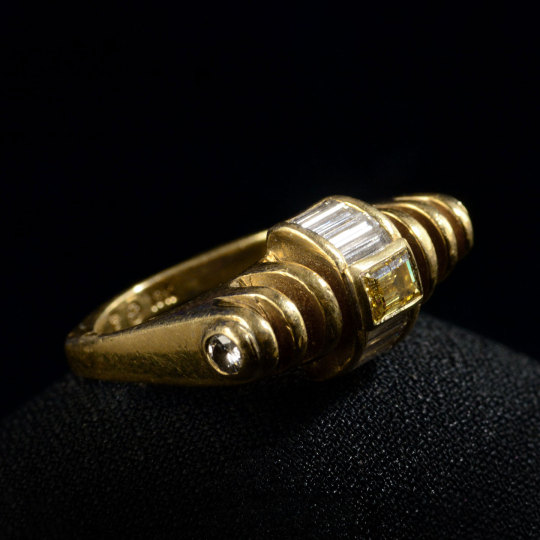
An unusual and very high quality c1975 ring with an arch of white diamond baguettes centering on a fancy yellow emerald cut diamond. A series of fins on either side terminate with round brilliant cut diamonds where they meet the shank. Built in 18K yellow gold and signed by unknown maker.
eriebasin.com
44 notes
·
View notes
Text

PHOTOSHOOT: FOAM MAGAZINE
If there was a way to sum up the "Electra Heart" era in fashion — I think this shot did the job
On July 7th, 2012 Marina Diamandis was photographed by JUCO for Foam magazine in Los Angeles. Glam by Amy Chance, hair by Aaron Light and manicure by Michelle Saunders.
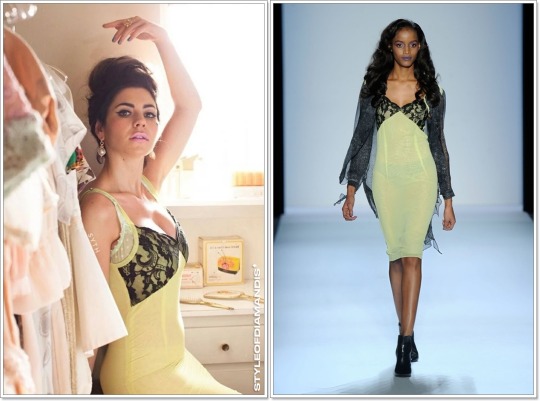
Simple as it may be, this is precisely the look, the beauty, and the styling I would have selected for this shot. Powerful in its stark simplicity.
For our first look, she wore this lime-colored slip dress ($295.00 - sold out) with contrasting black lace details from Emerson's Fall/Winter 2012 collection.
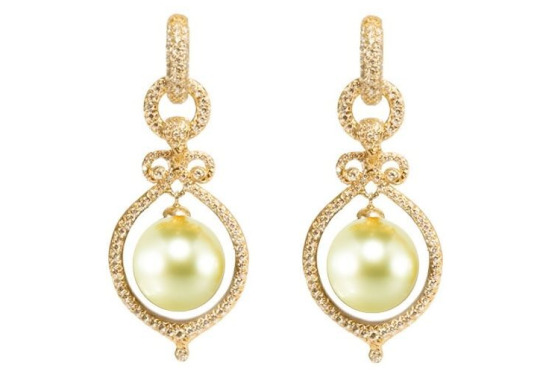
Jeweller Erica Courtney seems to have been assigned as the official bauble provider for this editorial, as Marina dons several of her pieces such as these white pearl, yellow-gold and diamond drop earrings ($31,700.00 - sold out).
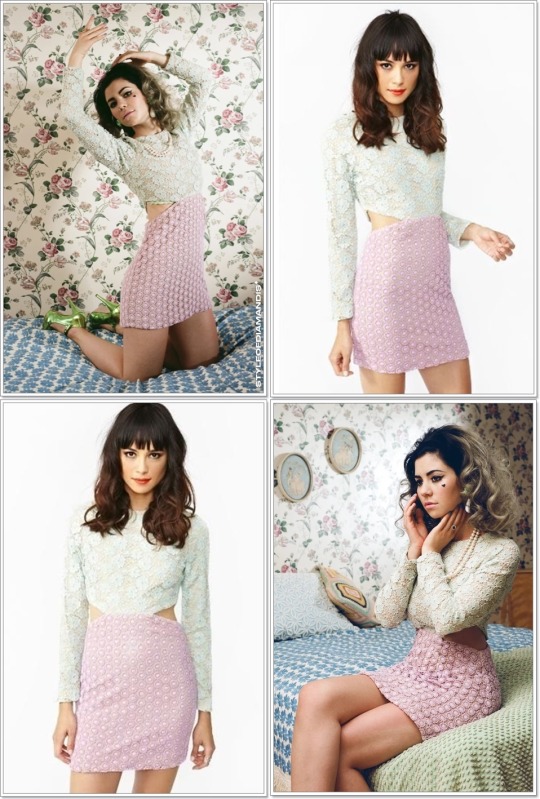
For the next set of photos, Marina is posing on a bed while wearing Aussie label SHAKUHACHI's mint-green and pink lace block cut-out dress ($525.00 - sold out).
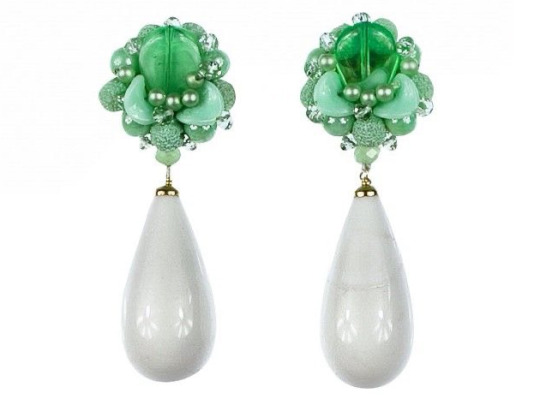
As in jewelry, the Greek-Welsh beauty rocked a pair of Jared Jamin's green flower and pearl drop earrings ($220.00 - sold out), along with Erica Courtney's platinum and diamond white pearl fancy charm necklaces ($10,000.00 - sold out) and 18k gold and diamond London blue topaz Zoey ring ($7,200.00 - sold out).
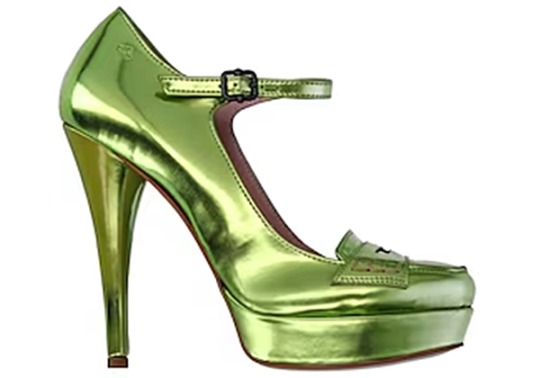
Marina completed her girly ensemble with these to-die-for metallic green penny loafer pumps ($275.00 - sold out) by Fornarina.
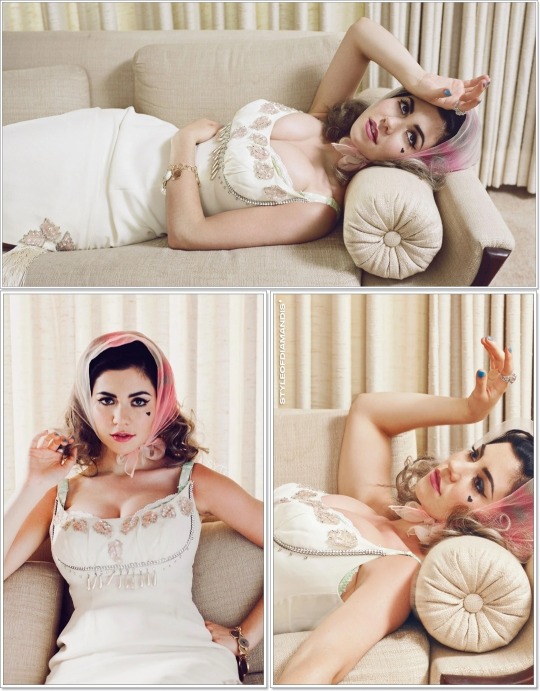
This retro-inspired look includes a vintage beaded and fringed cream pencil dress which was paired with the stylist's own sheer silk scarf and jewelry by Erica Courtney which included the Super Cool gold coin charm bracelet ($20,000.00 - sold out) and Pillow Top ring ($19,000.00 - sold out).

My favorite look of this editorial includes Marina wearing these apple-green and purple cut-out lenses – fruit of the collaboration from Prabal Gurung and Linda Farrow for Prabal's Spring/Summer 2012 runway!
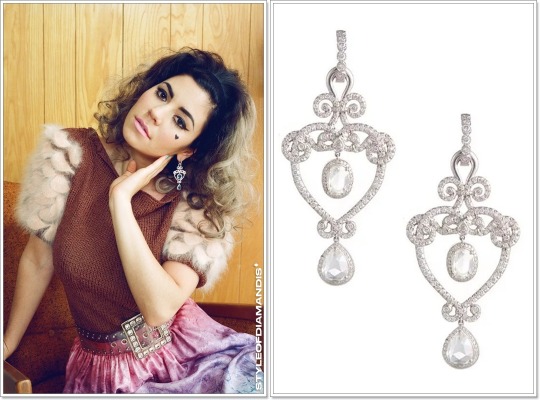
I wasn't able to ID her outfit down but Marina wears yet another stunning design by Erica Courtney. On her, we can spot a blue topaz version of these romantic chandelier earrings with diamonds.

For the penultimate look, Marina posed outside while wearing her stylist's own beaded vintage cardigan on top of a vintage white silk blouse, and vintage grey leather daisies-embroidered belt sourced at Modern Vintage Today.
Her white and black polka-dot organza circle skirt ($450.00) was created by emerging designer House of Ronald.
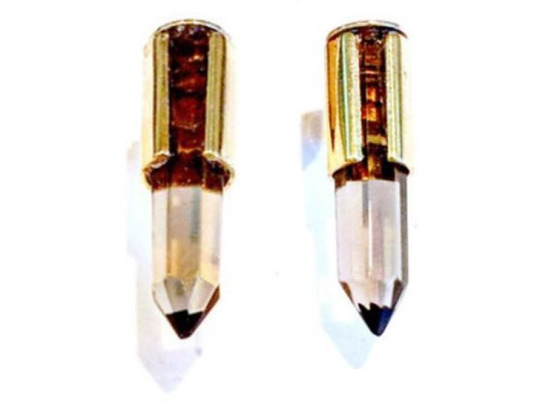
This very feminine look was further enhanced with the Serefina Dagger stud earrings ($50.00 - sold out) and her aforementioned Fornarina pumps.

For the final look, things get bright and pink with this SHAKUHACHI neon-pink poplin blouse ($263.00 - sold out) which Marina paired with a vintage rose lace pencil skirt from Hot Mess Vintage.

The jewelry for this look is by none other than Erica Courtney and featured the namesake Erica diamond stud earrings ($11,000 - sold out) and Shayne pearl and diamond pendant necklace ($44,000 - sold out).
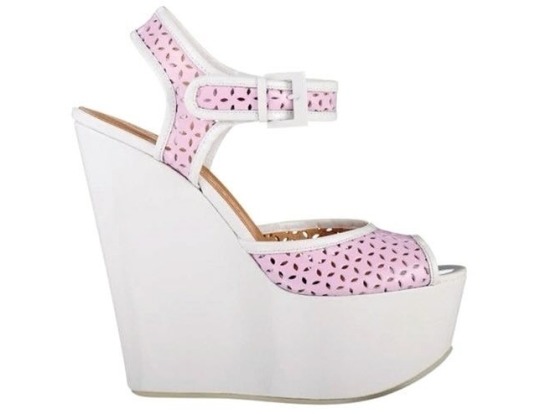
Last but definitely not least, Marina completed the look with these Kurt Geiger Spring/Summer 2012 white and pink perforated leather platform wedges!
#July 2012#Emerson#Erica Courtney#SHAKUHACHI#Jared Jamin#Fornarina#Prabal Gurung#Linda Farrow#Serefina#Modern Vintage Today#House of Ronald#Hot Mess Vintage#Kurt Geiger
7 notes
·
View notes
Text
A Vision: The Collection of Michelle Smith
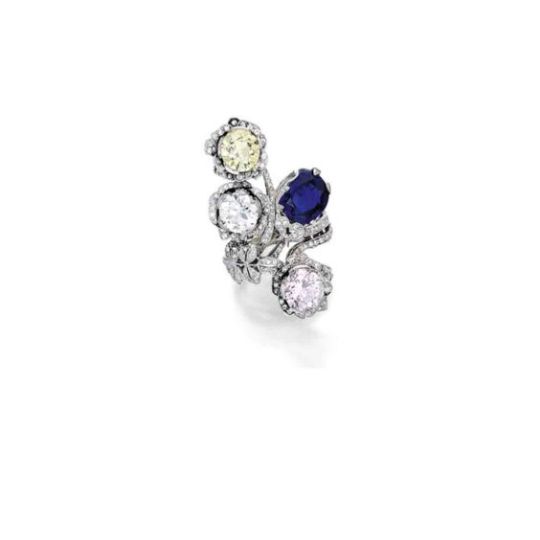
Diamond, Colored Diamond and Sapphire Ring
of stylized floral design, featuring two old European-cut diamonds, one of yellow hue, a round Fancy Brownish Pink diamond, and a cushion-cut sapphire, accented by single and rose-cut diamonds
size 5¾
Sotheby's
#jewelry#jewellery#jewels#ring#rings#diamond#diamonds#colored diamonds#yellow diamond#pink diamond#sapphires#sapphire#blue sapphire#tiara crown#tiaras crowns#tiarascrowns#tiaracrown
10 notes
·
View notes
Text
Diamond Green Round | Round Cut Diamond | Natural Diamond | 0.24Ct Green Diamond to make Engagement Ring | Fancy Yellow Diamond I HD Video
Link
3 notes
·
View notes
Text
Solitaire Engagement Rings: Your Complete Guide
Categories: Engagement Rings

Timeless, elegant, and highly popular, solitaire engagement rings continue to capture hearts with their minimalist beauty. Loved for their simple yet refined design, these rings are a top choice for those seeking a sophisticated look. At Woner International, a diamond jewelry exporter of global repute, we offer a stunning selection of solitaire engagement rings that stand out for their exceptional craftsmanship and style.
Whether it’s a proposal or a special anniversary, solitaire rings symbolize life’s most precious moments with their sleek bands and brilliant diamonds. In this guide, we’ll explore everything you need to know about solitaire engagement rings and why they’re a favorite in the world of fine jewelry.
What Is A Solitaire Engagement Ring?
The term "solitaire" originates from the Latin word “Solus,” meaning "alone" or "sole." In the world of jewelry, a solitaire engagement ring refers to a single diamond set prominently on a metal band, creating a classic and elegant look. Solitaire rings are known for their simplicity and their ability to highlight the diamond’s brilliance. At Woner International, our solitaire diamond rings showcase exquisite craftsmanship, offering clients timeless beauty in every piece.
Why Choose A Solitaire Engagement Ring?

For individuals with a refined sense of style, solitaire engagement rings are the perfect choice. The simplicity of the design ensures that the center diamond shines brilliantly, making it the star of the show. Here are a few reasons why solitaire engagement rings are a great choice:
Uncomplicated Beauty: With no additional stones or elaborate details, the solitaire setting allows the diamond to truly shine.
Timeless Appeal: The minimal design ensures that this style never goes out of fashion, offering sophistication for years to come.
Versatile: Solitaire rings pair beautifully with gemstone jewelry or wedding bands, making them adaptable to any occasion or style.
Customization Options: Whether you prefer rose gold, yellow gold, or platinum, you can customize your solitaire ring to suit your personal style. At Woner International, we provide a wide range of options to make your solitaire engagement ring unique.
The combination of diamond jewelry exporter expertise and high-quality materials ensures that your solitaire ring from Woner International will remain a cherished symbol of love and commitment.
Solitaire Engagement Rings for Every Diamond Shape

Solitaire rings are designed to accommodate various diamond shapes and sizes, ensuring the diamond remains secure and beautifully highlighted. While round diamonds are the traditional choice, you can also opt for fancy shapes such as oval, pear, cushion, marquise, and emerald cut diamonds. At Woner International, a diamond jewelry exporter, we provide a diverse range of diamond shapes to match every preference and style.
What to Look For in a Solitaire Engagement Ring
When choosing a solitaire engagement ring, the most important aspect to consider is the quality of the diamond. Since the design is simple, all the attention is on the center stone. Therefore, it’s essential to choose a high-quality diamond that is certified and evaluated based on the 4 Cs: Cut, Color, Clarity, and Carat.
At Woner International, we recommend diamonds that are GIA-certified, ensuring that your solitaire ring not only looks magnificent but also meets the highest industry standards. Whether you’re looking for a classic round diamond or a unique fancy shape, our experts are here to guide you through the process.
Additionally, there are a variety of prong settings to choose from, including classic four-prong, six-prong, bezel, and cathedral settings. Each style offers its own unique aesthetic, allowing you to create a personalized design that reflects your taste.
Pros and Cons of a Solitaire Setting

Pros:
Timeless and classic design that never goes out of style.
Versatile enough to pair with any wedding band.
Emphasizes the beauty of the center diamond.
Cons:
Fewer design elements compared to more elaborate settings.
More frequent cleaning may be needed as there are no other stones to distract from dirt on the diamond.
Lab-Created Diamond Solitaire Ring Price

If you're seeking affordability without compromising on quality, consider a lab-grown diamond solitaire engagement ring. Lab-grown diamonds are 100% real diamonds with the same chemical and optical properties as natural diamonds. At Woner International, a trusted diamond jewelry exporter, we offer lab-created diamonds that are both eco-friendly and budget-friendly.
Lab-grown diamonds are priced about 30% lower than earth-mined diamonds, making them an excellent choice for those looking to create a custom solitaire engagement ring without breaking the bank. You’ll get the same brilliance, clarity, and durability, but at a more affordable price.
Solitaire Engagement Rings With a Wedding Band
Solitaire engagement rings are highly versatile and pair beautifully with nearly any wedding band. For a harmonious look, choose a wedding band that matches the metal of your engagement ring. For those looking to add extra sparkle, stacking multiple bands on either side of the solitaire ring is a popular trend.
At Woner International, we offer custom options for both engagement rings and wedding bands, allowing you to create a seamless set that’s as unique as your love story.
FAQs
What is the difference between a solitaire and a diamond? A solitaire refers to the setting—a single stone placed on the band—while a diamond refers to the type of gemstone. Solitaire settings can hold diamonds or other gemstones.
Does an engagement ring have to be a solitaire? No, while solitaire rings are the most popular, there are many other engagement ring styles to choose from.
Why are solitaire rings the best? Solitaire rings are incredibly versatile and timeless, allowing for easy pairing with wedding bands of various styles. Their minimal design ensures that they’ll never go out of fashion.
At Woner International, we pride ourselves on being a premier diamond jewelry exporter, offering the finest solitaire engagement rings to clients around the globe. Whether you prefer a traditional diamond or a lab-grown alternative, we’re here to help you create the ring of your dreams. Contact us today to begin your journey toward the perfect engagement ring!
#SolitaireRings#EngagementRing#DiamondJewelry#TimelessDesign#WeddingRingInspiration#JewelryForHer#LuxuryJewelry#DiamondJewelryExporter#FineJewelry#BridalJewelry#JewelryLovers#JewelryBlog#RingGoals#JewelryCraftsmanship#HandcraftedRings
2 notes
·
View notes
Photo
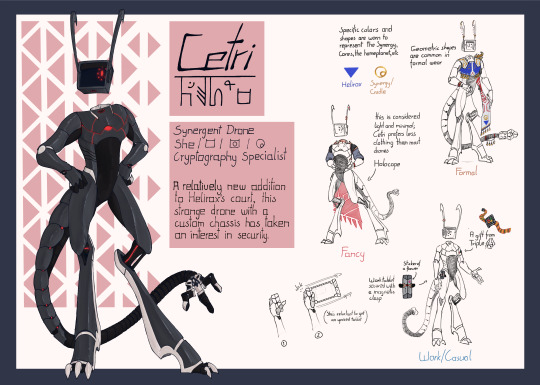

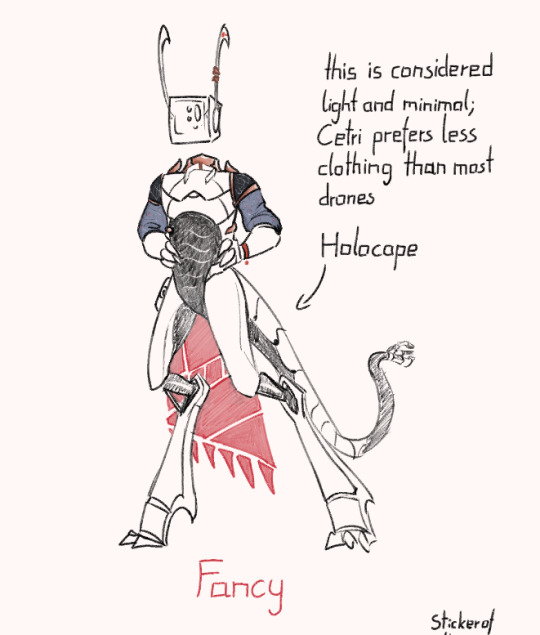
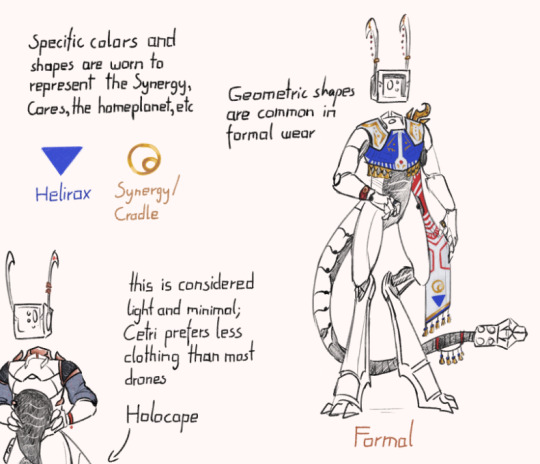
finally finished this sheet of a character near and dear to my heart!!
I loved figuring out the clothing and little details scattered throughout, so please click on the images to see said detail ;) Alt text under the cut:
Image 1:
Cetri, a bipedal robot with digitigrade, spurred legs, a long tail with a grasper at the end, a floating head with curved metal antenna and red glowing circuitry over her body. She's standing incontrapposto with a slightly dismissive or skeptical expression.
The text says: Cetri (name transcribed into Galarine alphabet below) Synergent Drone She / (Noun Classes of Drone, Core, and a custom one) Cryptography Specialist A relatively new addition to Helirax's court, this strange drone with a custom chassis has taken an interest in security.
-
Image 2:
An image of Cetri in her work/casual outfit. It does not feature much aside from:
A little arm band made out of green, red, orange, and yellow with a diamond shaped metal clasp and a red ruby in the middle. It's a gift from Triple, a drone with sharp upwardds pointing antenna.
A decorative metal ring on one antenna.
An electronic work tablet that's fixed to her thigh with a magnetic clasp. It's primarily grey with a little orange and redm and has a few buttons as well as a sticker of a red-pink-white flower.
There is a diagram of how the work tablet extends to show the display if you click the middle button. It's visible that the tablet is a little too small for her hands, but she's reluctant to get an upsized tablet.
-
Image 3:
This is Cetri in a fancy outfit. It's light clothing, mostly just featuring:
Sleeves with rose gold and sliver embroidery and highlights that end at her elbows. A little red armband that has a rose gold disc.
A holocape clasped to her back with rose metal vaguely mimicking a collar. It extends down as a red hologram of a simple cape with geometric shapes in it.
Two rose bands on one antenna, and a red circular sticker.
The additional text reads: this is considered light and minimal; Cetri prefers less clothing than most drones.
-
Image 4:
This is Cetri in formal clothing, which is worn in official functions.
It consists of:
A white/blue vest with gold embroidery and a red pearl in the middle. It has tassels at the bottom.
A cape clasped to the left shoulder with elaborate metal parts at the top. It's made of fabric and extends down with a pattern of red and white, culminating in the golden Synergy symbol and a blue triangle.
It also has gold tassels at the bottom. Her tail has two red bands connected by a dangling string of pearls and tassels.
An arm band made of red and rose metal. Two golden metal bands connected by pearls on each antenna.
The text reads: Specific colors and shapes are worn to represent the Synergy, Cores, the homeplanet, etc (here shown are the symbols of the Synergy and Helirax, the blue triangle)
Geometric shapes are common in formal wear.
#robot#original species#artists on tumblr#the Synergy#Cetri#Cetri'vel#drones#character sheet#brazenart#my art
20 notes
·
View notes
Text
What are some popular gemstone varieties available on Kishore Motiwala's website, and what are their unique properties?
Kishore Motiwala's website offers a wide range of popular gemstone varieties, each with unique properties that appeal to different tastes and purposes. Here are some of the prominent gemstones available:
1. Ruby
Color: Vivid red to purplish-red.
Properties: Known as the "king of gemstones," rubies are highly prized for their exceptional hardness (second only to diamonds) and vibrant color. They symbolize passion, protection, and prosperity.
2. Sapphire
Color: Available in various colors, with blue being the most popular.
Properties: Sapphires are renowned for their durability and beauty. Blue sapphires are associated with wisdom, loyalty, and nobility, while other colored sapphires, known as "fancies," have their unique significances.
3. Emerald
Color: Rich green.
Properties: Emeralds are cherished for their lush green color and rarity. They are believed to bring harmony, growth, and foresight. Due to their inclusions, known as "jardin," they have a distinct charm.
4. Diamond
Color: Typically colorless, but available in a range of colors.
Properties: Diamonds are celebrated for their unmatched brilliance and hardness. They symbolize purity, strength, and eternal love, making them a popular choice for engagement rings and fine jewelry.
5. Pearl
Color: White, cream, pink, silver, black, and more.
Properties: Pearls are unique among gemstones as they are organic. They are valued for their lustrous, soft glow and symbolize purity, elegance, and femininity. They are often associated with the moon and water elements.
6. Amethyst
Color: Deep purple to light lavender.
Properties: Amethysts are a type of quartz known for their calming and spiritual properties. They are believed to promote clarity of mind, emotional balance, and protection against negative energies.
7. Topaz
Color: Comes in various colors, with golden yellow and blue being most popular.
Properties: Topaz is known for its clarity and range of colors. It is associated with calmness, healing, and fortune. Blue topaz, in particular, is often linked with communication and self-expression.
8. Garnet
Color: Red, green, orange, pink, and more.
Properties: Garnets are known for their revitalizing and energizing properties. They are believed to inspire love, passion, and creativity. The rich variety of colors allows for versatile use in jewelry.
9. Aquamarine
Color: Pale blue to blue-green.
Properties: Aquamarines are prized for their serene color and clarity. They are thought to embody the essence of the sea, promoting tranquility, courage, and clear communication.
10. Citrine
Color: Yellow to golden brown.
Properties: Citrine is known as the "success stone" for its believed ability to attract wealth and prosperity. It is also associated with positivity, energy, and creativity.
Kishore Motiwala's collection offers these gemstones in various cuts, settings, and designs, catering to diverse aesthetic preferences and symbolic meanings.
2 notes
·
View notes
Photo
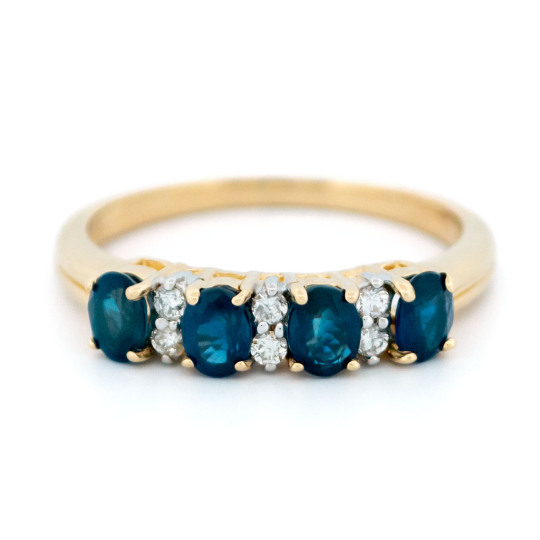
Diamond Sapphire 14k Row Ring 14988-8451
This ring is a timeless piece of jewelry that will never go out of style. The sapphires are exquisite stones that have a deep blue color and a smooth oval shape. They are accented by brilliant-cut diamonds that add sparkle and contrast. The ring is crafted in 14k yellow and white gold, which creates a harmonious blend of tones and textures.
Details: four totaling ±0.70ct Sapphire, ±0.15ct (H SI1) Brilliant-cut diamonds, 14k Ring. Design Era: Contemporary. Size: 18.54 NL / 58.3 FR / 8½ US / Q½ UK, sizeable (Within reason. Contact seller for information). Dimensions: H 0.4 x L 1.6 x W 0.4 cm. Weight in grams: 3. Condition: New.
This classic piece ships from our store in the center of Amsterdam, The Netherlands. We offer both registered shipping and local pickup at our store, with any applicable shipping costs refunded in the case of local pickup.
Add some sparkle to your style with Binenbaum.com. We offer a stunning selection of antique and vintage jewelry that you won't find anywhere else. Whether you're looking for a timeless ring, a dazzling necklace, or a unique brooch, we have something for every taste and occasion. Visit our website today and treat yourself to a piece of history.
Design Era : Contemporary. Era Information : Contemporary jewellery is a type of jewellery that reflects current trends and styles, and is often made from a variety of materials beyond the traditional precious metals and stones. This allows contemporary jewellery to have a more modern and unique appearance compared to classic jewellery. To create contemporary jewellery, it is necessary to have both specialized training and a deep understanding of the subject. The contemporary style combines historical techniques and artistic expression with innovative ideas and materials, giving it a distinct personality that falls between fashionable mass-produced jewellery and traditional artisanal works of art.. Materials : Diamond, Sapphire. Material Information : Sapphire Sapphire is a mineral made from aluminum oxide that is known for its beautiful colors, including blue, pink, yellow, green, purple, and orange. The most popular variety of sapphire is blue sapphire, which has a medium to deep blue color and strong saturation. Blue sapphire is typically the most popular and most affordable of the three major precious gemstones (emerald, ruby, and sapphire) and is often used in a variety of different types of jewelry, including rings, earrings, pendants, and bracelets. Fancy sapphires, which are available in a variety of different colors, are often more rare and expensive than blue sapphires and are prized for their unique and beautiful colors. Sapphire is a very hard and durable gemstone, with a Mohs hardness of 9 out of 10, which makes it resistant to scratches and other types of damage. It is also believed to have various healing properties and is sometimes used in traditional medicine and meditation practices. Brilliant-cut diamond The round brilliant cut is a type of diamond cut that was developed in the early 1900s and is now the most popular and widely used diamond cut. It is characterized by a circular girdle and 58 facets, which are small, flat surfaces that are cut into the diamond to create a specific shape and enhance its sparkle and brilliance. Unlike the old European cut, the round brilliant cut does not have a culet (the bottom edge of the diamond). The round brilliant cut was designed to maximize the fire and brilliance of a diamond, and it has become the standard cut for diamonds. It is known for its bright, sparkling appearance and is often used in engagement rings and other high-end jewelry. The round brilliant cut became prevalent during the Art Deco and Retro periods and is still widely used today. Round brilliant cut diamonds are typically more expensive than diamonds with other cuts because they require more labor and material to produce. However, they are considered the highest quality and most desirable type of diamond cut, and they are a popular choice for those who want the highest level of sparkle and brilliance in their jewelry. 14k 14k gold is a popular choice for use in jewelry because it is durable, yet still relatively affordable compared to higher karat golds like 18k or 24k. It is made up of 58.5% pure gold and is mixed with other metals to make it harder and more durable. 14k gold is available in a range of colors, including yellow, white, and rose, and is commonly used in a variety of jewelry pieces such as rings, earrings, necklaces, and bracelets. One of the advantages of 14k gold is that it is more resistant to wear and tear than pure gold, which makes it suitable for everyday wear. However, it is still softer than other alloys such as stainless steel or platinum, so it may require more maintenance to keep it looking its best. Overall, 14k gold is a popular choice for those who want the look and feel of gold, but at a more affordable price point.. Size : 18.54 NL / 58.3 FR / 8½ US / Q½ UK. Dimensions : H 0.4 x L 1.6 x W 0.4 cm. Gender : female. Weight (in grams) : 3. Condition : New. Offers : no. https://www.binenbaum.com/product/diamond-sapphire-14k-row-ring-14988-8451/
#14k#14k ring#amsterdam#antique jewellery#antique jewelry#binenbaum antiques jewelry#bridal#bridaljewellery#bridetobe#contemporary ring#diamond#diamond ring#engagement#engagementring#gettingmarried#ido#iloveyou#isaidyes#loveyou#sapphire#sapphire ring#selflove#shesaidyes#spiegelkwartier#vintage jewellery#vintage jewelry#weddingband#weddingring
2 notes
·
View notes
Note
Jewelry anon here - what do you want to know lol?
I mean, as far as I can tell, she has three main pairs of earrings (she doesn’t seem to like them and only wears them for really fancy/important events like dinners, gala’s, and state funerals). She has the diamond drop earrings with the yellow/canary stone like I discussed, then the smaller diamond drop earrings with a circular white diamond that she wore to Emmanuel’s second inauguration, for example, and then the pearl stud earrings she’s worn to Queen Elizabeth’s funeral. That last one she also wore again fairly recently so it may not be a loan, like I originally thought, but I’m thinking given how often she’s worn the other two she likely owns them.
In terms of necklaces, she wears a short simple silver chain a lot under her button up style tops (sometimes you can catch it behind the collar). I’ve never seen a charm on it, so it’s likely just the chain, although I imagine given how frequently she wears it, there must be some story attached to it. She doesn’t seem to like long necklaces - almost all the ones she’s worn are short and are hidden under the collar or hit on a low cut jacket/suit right at her collarbone.
In terms of her rings - of which there are a lot - the To Love and Cherish account did a nice round up a while back ago, but there’s a few main rings obviously: her wedding ring (which she wears with a lot of different kind of rings), her Archi ring, this square diamond ring, the blue/red shield rings, a regular finger French flag ring, a pinky/signet ring with the French flag, the silver ring with the blue stone, the diamond and sapphire shield ring, a lot of silver and yellow gold twisty or stack band rings. As someone who doesn’t have the money for fine jewelry but really likes to look at it, her ring collection is full of very expensive pieces. So when people ask where all his money from Rothschild went - it went into her jewelry box.
Thank you so much! 💙
4 notes
·
View notes
Text
A Complete Guide to Choosing the Perfect Diamond Ring for Every Occasion
The Allure of a 5 Carat Diamond Ring: Choosing the Perfect Sparkle
Finding the right diamond ring is a journey filled with excitement and a touch of sparkle. Whether you are preparing for a proposal or treating yourself to something special, a 5-carat diamond ring can be a true statement piece. In this blog, we will dive into the captivating world of these magnificent gems and explore how to choose the perfect one for you.
Introduction to 5-Carat Diamond Rings — Understanding their appeal and significance.
Excitement of the Selection Process — The joy of choosing the perfect diamond ring.
A True Statement Piece — How a 5-carat diamond ring stands out.
Budgeting for Your 5 Carat Diamond Investment

What Defines a Fancy Yellow Diamond?
A Fancy Engagement Yellow Diamond Rings gets its color from the presence of nitrogen during its formation. Unlike faint yellow diamonds, which are considered lower in value, Fancy Yellow Diamonds have a rich, saturated color that is graded as “Fancy” by the Gemological Institute of America (GIA). These stones are prized for their beauty and rarity, making them a favorite choice for yellow diamond engagement ring, statement pieces, and collectors.
How to Care for Your Oval Diamond Rings to Ensure They Last a Lifetime
7 carat Oval diamond ring are a timeless and elegant choice, combining vintage charm with modern sophistication. However, to preserve their beauty and radiance over the years, proper care and maintenance are crucial. In this guide, we will walk you through effective ways to care for your oval diamond rings, ensuring they remain as stunning as the day you first wore them.
How to Care for Your Oval Diamond Ring
Timeless Elegance — Oval diamond rings blend vintage charm with modern sophistication.
Importance of Proper Care — Regular maintenance ensures lasting brilliance and beauty.
Avoid Harsh Conditions — Keep your ring safe from strenuous activities and household chemicals.

The Ultimate Guide to Choosing Blue Diamond Jewelry for Your Wedding Day
Your wedding day is one of the most important days of your life. Every detail matters — from the dress to the venue, the flowers to the jewelry. Blue diamond rings offer a unique and stunning choice that can elevate your ensemble. This guide explores the allure of blue diamonds and provides tips for selecting the perfect pieces to complement your wedding day attire.
Blue engagement rings have occupied a significant cultural space, particularly in contemporary bridal fashion. Iconic Hollywood engagements have spotlighted these stones as ultimate symbols of marquee relationships, influencing bridal design trends across generations.
The Rise of Vintage-Inspired Designs
Vintage-inspired designs are making a strong comeback in the realm of emerald cut diamond engagement rings. These designs often incorporate intricate details reminiscent of the Art Deco era, featuring milgrain edges, filigree engravings, and ornate settings that exude romance and nostalgia. The allure of these designs lies not only in their visual charm but also in their ability to connect us to the past while embracing the present.
Comeback of Vintage Styles — Emerald cut diamond engagement rings are embracing classic aesthetics.
Art Deco Influence — Designs feature intricate details like milgrain edges, filigree engravings, and ornate settings.
Romantic & Nostalgic Appeal — These rings connect the past with modern elegance.

How to Choose the Perfect 4 Carat Diamond Ring for Engagements?
Choosing the perfect engagement ring is a significant decision that reflects your love and commitment. When it comes to a statement piece like a 4 carat diamond ring, there are several key factors to consider. This guide will help simplify the process, making sure you choose a ring that ticks all the right boxes.
Understand the Importance of the 4 Cs
Before purchasing, familiarize yourself with the 4 Cs: Carat, Cut, Clarity, and Color. These factors impact the ring’s appearance and value. For a 4 carat emerald cut diamond ring, each aspect can greatly influence the overall impression of the ring.
Understanding the Importance of the 4 Cs
Carat — Represents the diamond’s weight; a 4-carat diamond makes a bold statement.
Cut — Determines the diamond’s brilliance and overall sparkle.
Clarity — Measures the presence of imperfections; higher clarity enhances elegance.
Carat weight is simply how much your diamond weighs, but in a 4 carat diamond, this means a prominent, stunning presence. It’s crucial to balance the carat with the other Cs to optimize the diamond’s brilliance. Diamonds like the elegant emerald cut offer exceptional clarity, enhancing their elegance.
Conclusion
A diamond ring is more than just a piece of jewelry — it is a symbol of love, commitment, and timeless beauty. Whether you are drawn to the brilliance of a 5-carat diamond, the uniqueness of a fancy yellow stone, or the sophistication of a vintage-inspired emerald cut, choosing the perfect diamond requires careful consideration of budget, quality, and personal style. Proper care and mindful wearing practices ensure your diamond retains its sparkle for generations to come. Visit Nekta New York for more information.
0 notes
Text
Lab Grown Diamond Engagement Rings – Ethical & Stunning Choices
Lab Grown Diamond Engagement Rings: A Brilliant Choice for Modern Love
When it comes to choosing the perfect engagement ring, modern couples are increasingly turning to lab grown diamond engagement rings. These stunning gems offer the same sparkle, brilliance, and durability as mined diamonds while providing a more ethical and sustainable alternative. If you're considering popping the question with a lab grown diamond, this guide will help you understand why it's a smart and responsible choice.
What Are Lab Grown Diamonds?
Lab grown diamonds, also known as synthetic or cultured diamonds, are created using advanced technological processes that mimic the natural diamond-growing environment. These diamonds possess the same chemical, physical, and optical properties as mined diamonds, making them virtually indistinguishable even to gemologists without specialized equipment.
There are two primary methods used to create lab grown diamonds:
High-Pressure High-Temperature (HPHT): This method replicates the intense heat and pressure conditions found deep within the Earth, allowing carbon to crystallize into a diamond.
Chemical Vapor Deposition (CVD): In this process, a carbon-rich gas is heated in a controlled environment, depositing layers of carbon onto a diamond seed until a fully formed diamond is produced.
Why Choose a Lab Grown Diamond Engagement Ring?
1. Ethical and Conflict-Free
One of the biggest advantages of lab grown diamond engagement rings is their ethical production. Traditional diamond mining has long been associated with concerns over environmental destruction, human rights violations, and conflict diamonds, also known as "blood diamonds." Choosing a lab grown diamond ensures that your ring is free from these ethical dilemmas.

2. Eco-Friendly and Sustainable
Mining natural diamonds requires extensive land excavation, water usage, and energy consumption, often leading to deforestation and habitat destruction. Lab grown diamonds, on the other hand, have a significantly smaller carbon footprint and require fewer resources, making them a more environmentally friendly choice.
3. Cost-Effective Without Compromising Quality
Lab grown diamonds are typically 20-40% more affordable than their mined counterparts, allowing couples to purchase a larger or higher-quality stone within their budget. Since these diamonds share the same characteristics as natural diamonds, buyers do not have to sacrifice brilliance or durability to enjoy significant savings.
4. Identical Beauty and Quality
Lab grown diamonds exhibit the same fire, sparkle, and durability as mined diamonds. They are graded and certified by leading gemological institutes such as the Gemological Institute of America (GIA) and the International Gemological Institute (IGI), ensuring that buyers receive a high-quality gemstone.
5. Customization and Availability
With lab grown diamonds, buyers have a wide selection of shapes, cuts, and sizes to choose from. Because they are grown in a controlled environment, they often have fewer inclusions and can be produced in rare colors, such as pink, blue, and yellow, at a fraction of the cost of naturally occurring fancy-colored diamonds.
How to Choose the Perfect Lab Grown Diamond Engagement Ring
1. Consider the 4Cs
Just like natural diamonds, lab grown diamonds are graded based on the 4Cs:
Cut: Determines the diamond’s brilliance and sparkle.
Color: Ranges from colorless (most desirable) to light yellow.
Clarity: Measures the presence of internal or external imperfections.
Carat: Refers to the diamond’s weight and size.
2. Choose the Right Setting
The setting plays a crucial role in enhancing the beauty of your lab grown diamond engagement ring. Popular settings include:
Solitaire: A classic and timeless choice featuring a single diamond.
Halo: A center stone surrounded by smaller diamonds for extra sparkle.
Pavé: Small diamonds set along the band for added brilliance.
Three-Stone: Represents the past, present, and future of a relationship.
3. Select a Metal for the Band
The metal of your ring band can significantly influence its overall appearance. Options include:
Platinum: A durable and hypoallergenic choice with a sleek, modern finish.
White Gold: Offers a bright, silvery appearance similar to platinum but at a lower cost.
Yellow Gold: A warm and traditional option.
Rose Gold: A romantic and trendy choice with a pinkish hue.
Where to Buy Lab Grown Diamond Engagement Rings
With the growing popularity of lab grown diamonds, numerous reputable jewelers now offer these stunning stones. When shopping, consider purchasing from well-known brands that provide certification, warranties, and ethical sourcing transparency. Some trusted retailers include Brilliant Earth, James Allen, and Clean Origin, among others.
Final Thoughts
Lab grown diamond engagement rings are an excellent choice for couples who value ethics, sustainability, affordability, and beauty. By opting for a lab grown diamond, you are investing in a stunning piece of jewelry that symbolizes your love without compromising your values. Whether you’re looking for a classic solitaire or a dazzling halo design, lab grown diamonds offer limitless possibilities for creating the perfect ring.
If you’re ready to find the perfect lab grown diamond engagement ring, explore your options and make a choice that reflects your love story in the most meaningful way.
For further information please see contact us
0 notes
Text
Finding the Perfect Engagement Ring Budget at Shemesh Diamonds

An engagement ring is not just a piece of jewelry; it is a symbol of love, commitment, and the beginning of a beautiful journey. At Shemesh Diamonds, we understand the emotional and financial importance of this special purchase. Setting a budget for an engagement ring doesn’t have to be overwhelming. With the right guidance, you can find a ring that resonates with your partner’s style without straining your finances.
Here’s a comprehensive guide to help you navigate your engagement ring budget while exploring the exquisite collection at Shemesh Diamonds.
Understanding Your Budget
The age-old “three months’ salary” rule for an engagement ring is no longer the standard. Today, setting a budget depends on your financial situation, priorities, and the value you attach to the ring. At Shemesh Diamonds, we recommend focusing on creating a balance between quality, style, and affordability.
Consider These Factors:
Your Financial Situation: Analyze your savings and future expenses. Allocate a portion of your savings specifically for the engagement ring to avoid unnecessary financial stress.
Your Partner’s Preferences: Knowing your partner’s taste is vital. Whether they prefer classic solitaires, vintage-inspired designs, or modern halo settings, understanding their preferences will narrow down your options.
The 4 Cs: The cut, color, clarity, and carat weight of the diamond significantly impact its price. At Shemesh Diamonds, our experts are here to guide you in choosing the perfect diamond within your budget.
Maximizing Your Budget at Shemesh Diamonds
At Shemesh Diamonds, we pride ourselves on offering high-quality diamonds at competitive prices. Here’s how you can make the most of your budget:
Choose a Slightly Smaller Carat Weight: Diamonds just below popular weight thresholds (e.g., 0.95 carats instead of 1 carat) often look nearly identical but cost less.
Opt for Excellent Cut: A well-cut diamond sparkles brilliantly, making it appear larger and more radiant. This can compensate for a slightly lower carat weight.
Consider Alternative Shapes: Round diamonds are the most popular, but fancy shapes like ovals, pears, and emeralds can be more affordable and equally stunning.
Prioritize Eye-Clean Clarity: Instead of opting for flawless clarity, choose a diamond with inclusions that are invisible to the naked eye. This can save you money without compromising beauty.
Explore Different Metal Options: Platinum is luxurious but more expensive. White gold or yellow gold can provide a similar look at a more affordable price.
Shemesh Diamonds’ Personalized Consultation
At Shemesh Diamonds, we offer personalized consultations to help you find the perfect engagement ring within your budget. Our experienced team will walk you through our exquisite collection, ensuring you make an informed decision. Whether you’re exploring timeless solitaire rings or intricate vintage designs, we’re here to assist every step of the way.
Beyond Engagement Rings: Initial Diamond Earrings
While planning your engagement ring purchase, don’t overlook other meaningful gifts. Initial diamond earrings make a thoughtful addition to your proposal or can be a memorable gift for a special occasion. These earrings combine timeless elegance with a personal touch, showcasing initials crafted in shimmering diamonds. At Shemesh Diamonds, we offer a stunning selection of initial diamond earrings to suit every style and budget.
How to Buy Diamond Stud Earrings
Diamond stud earrings are a classic jewelry staple, perfect for any wardrobe. Here are some tips for how to buy diamond stud earrings:
Choose the Right Setting: The setting impacts the overall look and security of the earrings. Prong settings highlight the diamond’s brilliance, while bezel settings offer a sleek, modern style.
Consider the 4 Cs: As with engagement rings, the cut, color, clarity, and carat weight of the diamonds matter. At Shemesh Diamonds, we’ll help you find the ideal pair within your budget.
Select the Appropriate Metal: Whether you prefer white gold, yellow gold, or platinum, choose a metal that complements your style and skin tone.
Pay Attention to Size: Smaller studs are perfect for daily wear, while larger stones create a bold statement for special occasions.
Why Shemesh Diamonds?
At Shemesh Diamonds, we are committed to providing unparalleled quality, exceptional service, and timeless designs. Our dedication to customer satisfaction ensures that every purchase is a memorable experience. From engagement rings to diamond stud earrings, our collection caters to every taste and occasion.
Conclusion
Setting an engagement ring budget doesn’t have to be daunting. With expert guidance from Shemesh Diamonds, you can find a ring that symbolizes your love without compromising your financial well-being. Don’t forget to explore other meaningful jewelry options, like initial diamond earrings or timeless diamond studs, to complement your special moments.
Visit Shemesh Diamonds today and let us help you celebrate life’s milestones with exquisite jewelry crafted to perfection.
0 notes